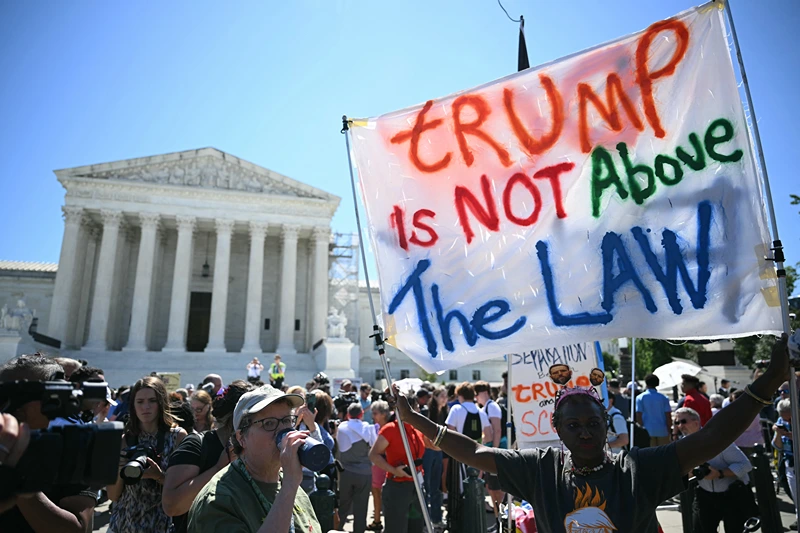
OAN Staff Blake Wolf
11:55 AM – Monday, July 29, 2024
On Monday morning, President Joe Biden wrote an opinion piece in The Washington Post detailing a massive constitutional amendment proposal focused on Supreme Court justices as well as presidential power.
Some of these proposals include adding term limits for Supreme Court Justices, creating a “binding code of conduct” for Supreme Court Justices, and stripping immunity from former U.S. presidents who have served in office.
However, “the main focus was the court’s recent decision to grant Trump broad immunity for any crimes committed in office,” The Post reported.
Advertisement
The constitutional amendment proposal, which Biden is calling the “No One Is Above The Law Amendment,” follows the Supreme Court’s 6-3 July 1st ruling that granted former President Trump immunity from prosecution for any actions that were within his constitutional powers.
Additionally, the July 1st ruling is historic, as it is the first recognizable ruling that protects presidents from prosecution.
“… the Supreme Court’s 6-3 decision on July 1 to grant presidents broad immunity from prosecution for crimes they commit in office means there are virtually no limits on what a president can do. The only limits will be those that are self-imposed by the person occupying the Oval Office,” Biden wrote. “If a future president incites a violent mob to storm the Capitol and stop the peaceful transfer of power – like we saw on Jan. 6, 2021 – there may be no legal consequences,” he continued.
Biden continued, addressing the slew of issues he has with the Supreme Court.
“On top of dangerous and extreme decisions that overturn settled legal precedents – including Roe v. Wade – the court is mired in a crisis of ethics. Scandals involving several justices have caused the public to question the court’s fairness and independence, which are essential to faithfully carrying out its mission of equal justice under the law. For example, undisclosed gifts to justices from individuals with interests in cases before the court, as well as conflicts of interest connected with Jan. 6 insurrectionists, raise legitimate questions about the court’s impartiality.”
Biden’s solution to this issue includes a “binding code of conduct for the Supreme Court,” which he claims is supported by a majority of Americans on both sides of the aisle.
“… I’m calling for a binding code of conduct for the Supreme Court. This is common sense. The court’s current voluntary ethics code is weak and self-enforced. Justices should be required to disclose gifts, refrain from public political activity and recuse themselves from cases in which they or their spouses have financial or other conflicts of interest. Every other federal judge is bound by an enforceable code of conduct, and there is no reason for the Supreme Court to be exempt.”
Lastly, Biden proposed a term limit for Supreme Court Justices in an attempt to lessen the power that a president has in appointing lifetime Supreme Court Justices.
“The United States is the only major constitutional democracy that gives lifetime seats to its high court. Term limits would help ensure that the court’s membership changes with some regularity. That would make timing for court nominations more predictable and less arbitrary. It would reduce the chance that any single presidency radically alters the makeup of the court for generations to come. I support a system in which the president would appoint a justice every two years to spend 18 years in active service on the Supreme Court.”
The last Constitutional amendment added was the 27th Amendment in 1992. Constitutional amendments must be proposed by a two-thirds vote in both the House and the Senate or a constitutional convention requested by 34 states.
Recently, Senator Lindsey Graham (R-S.C.) was asked by CBS reporters if he would work with President Biden on court reform, to which Graham responded by accusing Democrats of attempting to “to undercut the conservative court.”
Stay informed! Receive breaking news blasts directly to your inbox for free. Subscribe here. https://www.oann.com/alerts

